Entrepreneurship Report: Ventures, Characteristics, and Personality
VerifiedAdded on 2020/02/03
|18
|3776
|33
Report
AI Summary
This report provides a comprehensive overview of entrepreneurship, exploring different types of entrepreneurial ventures such as small businesses, scalable startups, large companies, and social entrepreneurship, along with their relationship to entrepreneurial typology. It delves into the similarities and differences between social and lifestyle entrepreneurship, providing real-world examples like EG Solutions and MOMA Foods. The report further examines the characteristics, traits, and skills of successful entrepreneurs, including innovation and perseverance, and assesses how entrepreneurial personality reflects motivation and mindset. It analyzes the impact of background and experience on entrepreneurship and discusses the differences between entrepreneurs and business managers. The report highlights the role of research and innovation in business growth, and the importance of risk-taking in generating profit. It also emphasizes the use of proper skills and knowledge in the competitive market to improve business operations.

Entrepreneurship
Paraphrase This Document
Need a fresh take? Get an instant paraphrase of this document with our AI Paraphraser
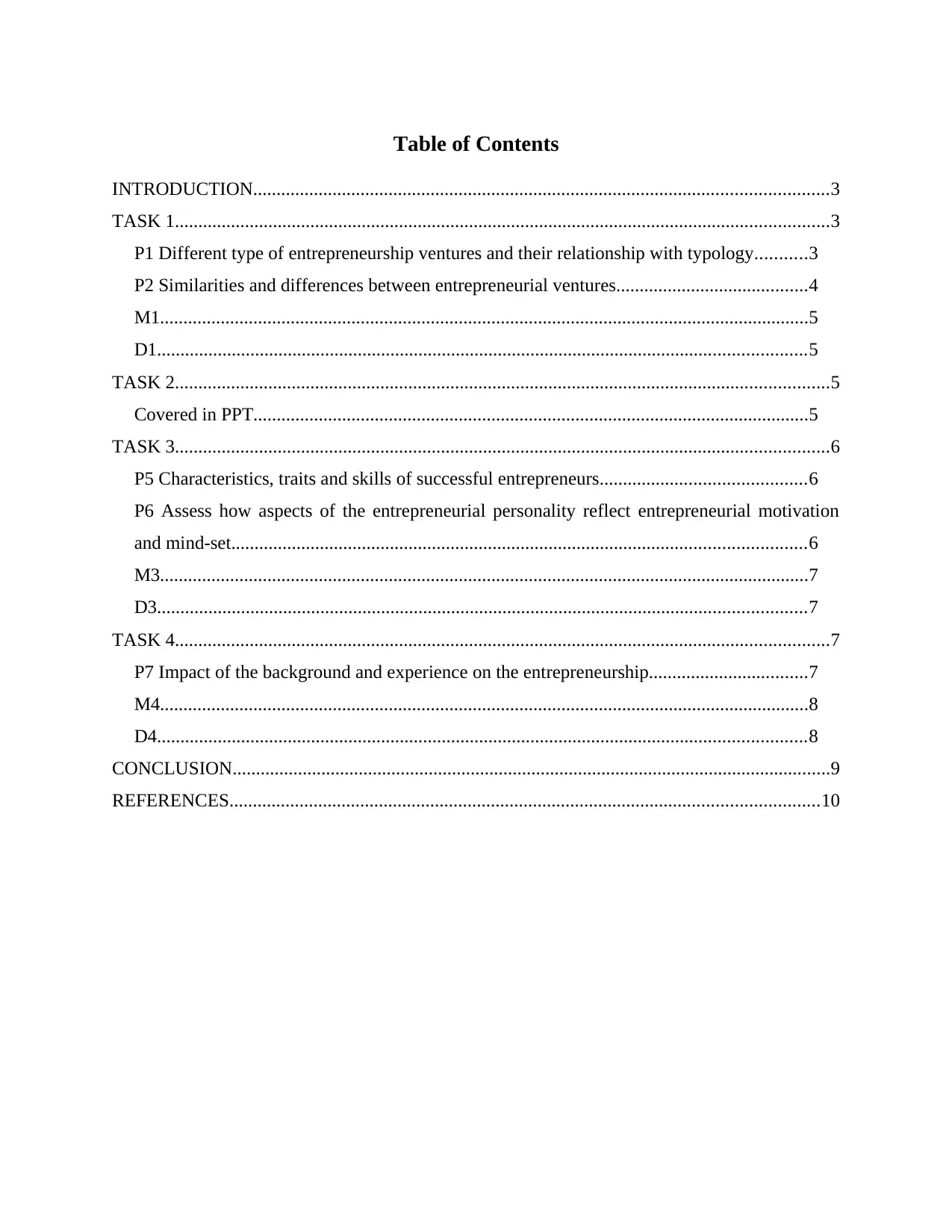
Table of Contents
INTRODUCTION...........................................................................................................................3
TASK 1............................................................................................................................................3
P1 Different type of entrepreneurship ventures and their relationship with typology...........3
P2 Similarities and differences between entrepreneurial ventures.........................................4
M1...........................................................................................................................................5
D1...........................................................................................................................................5
TASK 2............................................................................................................................................5
Covered in PPT.......................................................................................................................5
TASK 3............................................................................................................................................6
P5 Characteristics, traits and skills of successful entrepreneurs............................................6
P6 Assess how aspects of the entrepreneurial personality reflect entrepreneurial motivation
and mind-set...........................................................................................................................6
M3...........................................................................................................................................7
D3...........................................................................................................................................7
TASK 4............................................................................................................................................7
P7 Impact of the background and experience on the entrepreneurship..................................7
M4...........................................................................................................................................8
D4...........................................................................................................................................8
CONCLUSION................................................................................................................................9
REFERENCES..............................................................................................................................10
INTRODUCTION...........................................................................................................................3
TASK 1............................................................................................................................................3
P1 Different type of entrepreneurship ventures and their relationship with typology...........3
P2 Similarities and differences between entrepreneurial ventures.........................................4
M1...........................................................................................................................................5
D1...........................................................................................................................................5
TASK 2............................................................................................................................................5
Covered in PPT.......................................................................................................................5
TASK 3............................................................................................................................................6
P5 Characteristics, traits and skills of successful entrepreneurs............................................6
P6 Assess how aspects of the entrepreneurial personality reflect entrepreneurial motivation
and mind-set...........................................................................................................................6
M3...........................................................................................................................................7
D3...........................................................................................................................................7
TASK 4............................................................................................................................................7
P7 Impact of the background and experience on the entrepreneurship..................................7
M4...........................................................................................................................................8
D4...........................................................................................................................................8
CONCLUSION................................................................................................................................9
REFERENCES..............................................................................................................................10

⊘ This is a preview!⊘
Do you want full access?
Subscribe today to unlock all pages.

Trusted by 1+ million students worldwide
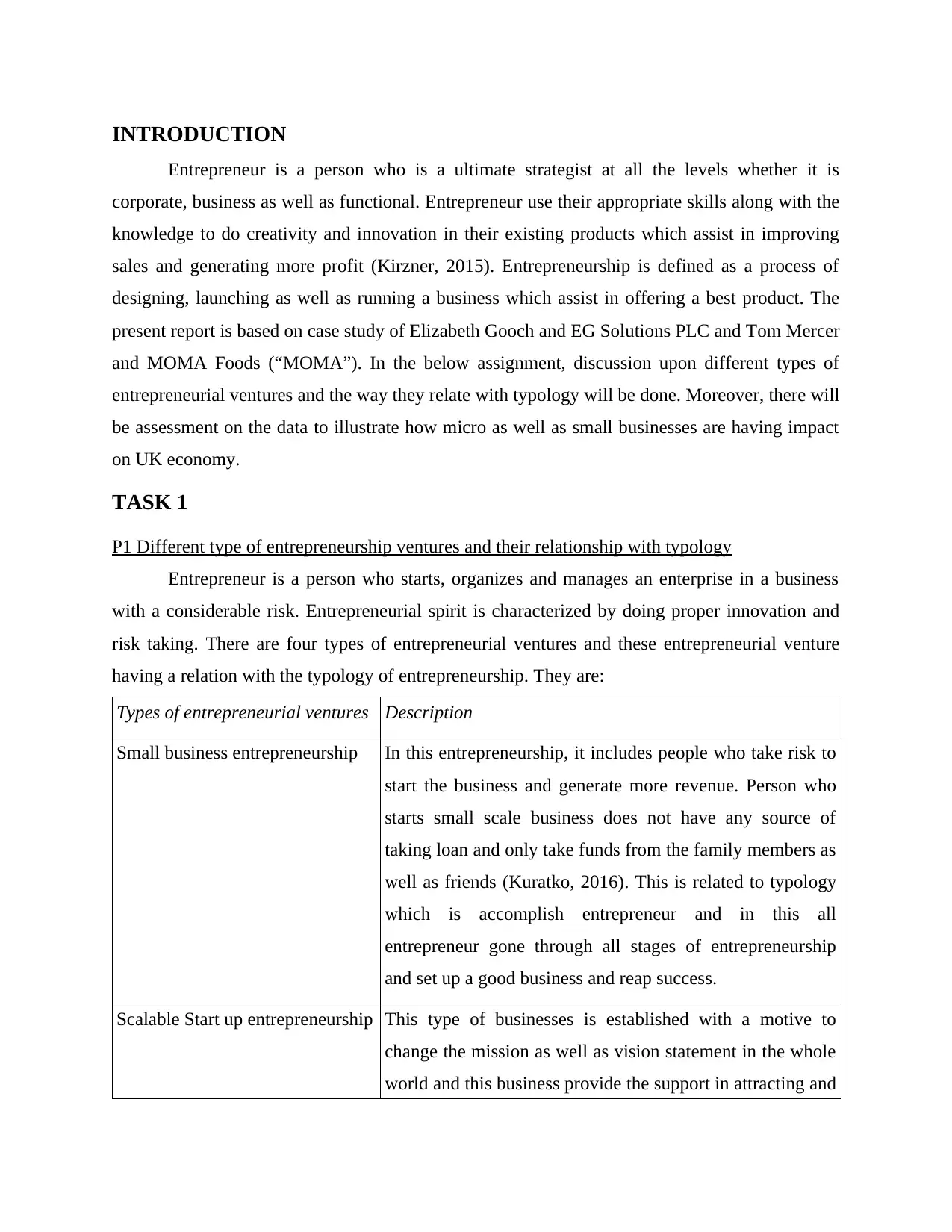
INTRODUCTION
Entrepreneur is a person who is a ultimate strategist at all the levels whether it is
corporate, business as well as functional. Entrepreneur use their appropriate skills along with the
knowledge to do creativity and innovation in their existing products which assist in improving
sales and generating more profit (Kirzner, 2015). Entrepreneurship is defined as a process of
designing, launching as well as running a business which assist in offering a best product. The
present report is based on case study of Elizabeth Gooch and EG Solutions PLC and Tom Mercer
and MOMA Foods (“MOMA”). In the below assignment, discussion upon different types of
entrepreneurial ventures and the way they relate with typology will be done. Moreover, there will
be assessment on the data to illustrate how micro as well as small businesses are having impact
on UK economy.
TASK 1
P1 Different type of entrepreneurship ventures and their relationship with typology
Entrepreneur is a person who starts, organizes and manages an enterprise in a business
with a considerable risk. Entrepreneurial spirit is characterized by doing proper innovation and
risk taking. There are four types of entrepreneurial ventures and these entrepreneurial venture
having a relation with the typology of entrepreneurship. They are:
Types of entrepreneurial ventures Description
Small business entrepreneurship In this entrepreneurship, it includes people who take risk to
start the business and generate more revenue. Person who
starts small scale business does not have any source of
taking loan and only take funds from the family members as
well as friends (Kuratko, 2016). This is related to typology
which is accomplish entrepreneur and in this all
entrepreneur gone through all stages of entrepreneurship
and set up a good business and reap success.
Scalable Start up entrepreneurship This type of businesses is established with a motive to
change the mission as well as vision statement in the whole
world and this business provide the support in attracting and
Entrepreneur is a person who is a ultimate strategist at all the levels whether it is
corporate, business as well as functional. Entrepreneur use their appropriate skills along with the
knowledge to do creativity and innovation in their existing products which assist in improving
sales and generating more profit (Kirzner, 2015). Entrepreneurship is defined as a process of
designing, launching as well as running a business which assist in offering a best product. The
present report is based on case study of Elizabeth Gooch and EG Solutions PLC and Tom Mercer
and MOMA Foods (“MOMA”). In the below assignment, discussion upon different types of
entrepreneurial ventures and the way they relate with typology will be done. Moreover, there will
be assessment on the data to illustrate how micro as well as small businesses are having impact
on UK economy.
TASK 1
P1 Different type of entrepreneurship ventures and their relationship with typology
Entrepreneur is a person who starts, organizes and manages an enterprise in a business
with a considerable risk. Entrepreneurial spirit is characterized by doing proper innovation and
risk taking. There are four types of entrepreneurial ventures and these entrepreneurial venture
having a relation with the typology of entrepreneurship. They are:
Types of entrepreneurial ventures Description
Small business entrepreneurship In this entrepreneurship, it includes people who take risk to
start the business and generate more revenue. Person who
starts small scale business does not have any source of
taking loan and only take funds from the family members as
well as friends (Kuratko, 2016). This is related to typology
which is accomplish entrepreneur and in this all
entrepreneur gone through all stages of entrepreneurship
and set up a good business and reap success.
Scalable Start up entrepreneurship This type of businesses is established with a motive to
change the mission as well as vision statement in the whole
world and this business provide the support in attracting and
Paraphrase This Document
Need a fresh take? Get an instant paraphrase of this document with our AI Paraphraser
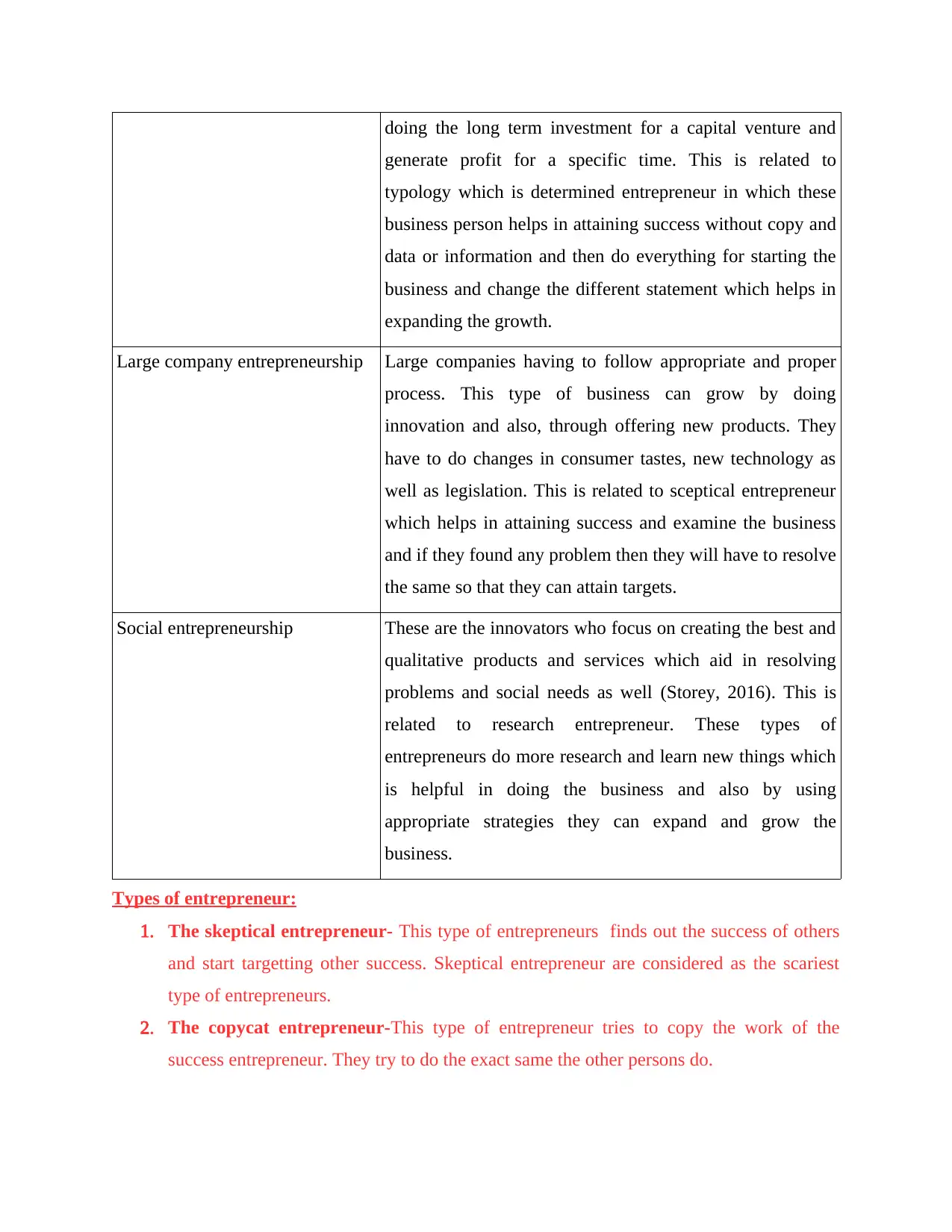
doing the long term investment for a capital venture and
generate profit for a specific time. This is related to
typology which is determined entrepreneur in which these
business person helps in attaining success without copy and
data or information and then do everything for starting the
business and change the different statement which helps in
expanding the growth.
Large company entrepreneurship Large companies having to follow appropriate and proper
process. This type of business can grow by doing
innovation and also, through offering new products. They
have to do changes in consumer tastes, new technology as
well as legislation. This is related to sceptical entrepreneur
which helps in attaining success and examine the business
and if they found any problem then they will have to resolve
the same so that they can attain targets.
Social entrepreneurship These are the innovators who focus on creating the best and
qualitative products and services which aid in resolving
problems and social needs as well (Storey, 2016). This is
related to research entrepreneur. These types of
entrepreneurs do more research and learn new things which
is helpful in doing the business and also by using
appropriate strategies they can expand and grow the
business.
Types of entrepreneur:
1. The skeptical entrepreneur- This type of entrepreneurs finds out the success of others
and start targetting other success. Skeptical entrepreneur are considered as the scariest
type of entrepreneurs.
2. The copycat entrepreneur-This type of entrepreneur tries to copy the work of the
success entrepreneur. They try to do the exact same the other persons do.
generate profit for a specific time. This is related to
typology which is determined entrepreneur in which these
business person helps in attaining success without copy and
data or information and then do everything for starting the
business and change the different statement which helps in
expanding the growth.
Large company entrepreneurship Large companies having to follow appropriate and proper
process. This type of business can grow by doing
innovation and also, through offering new products. They
have to do changes in consumer tastes, new technology as
well as legislation. This is related to sceptical entrepreneur
which helps in attaining success and examine the business
and if they found any problem then they will have to resolve
the same so that they can attain targets.
Social entrepreneurship These are the innovators who focus on creating the best and
qualitative products and services which aid in resolving
problems and social needs as well (Storey, 2016). This is
related to research entrepreneur. These types of
entrepreneurs do more research and learn new things which
is helpful in doing the business and also by using
appropriate strategies they can expand and grow the
business.
Types of entrepreneur:
1. The skeptical entrepreneur- This type of entrepreneurs finds out the success of others
and start targetting other success. Skeptical entrepreneur are considered as the scariest
type of entrepreneurs.
2. The copycat entrepreneur-This type of entrepreneur tries to copy the work of the
success entrepreneur. They try to do the exact same the other persons do.
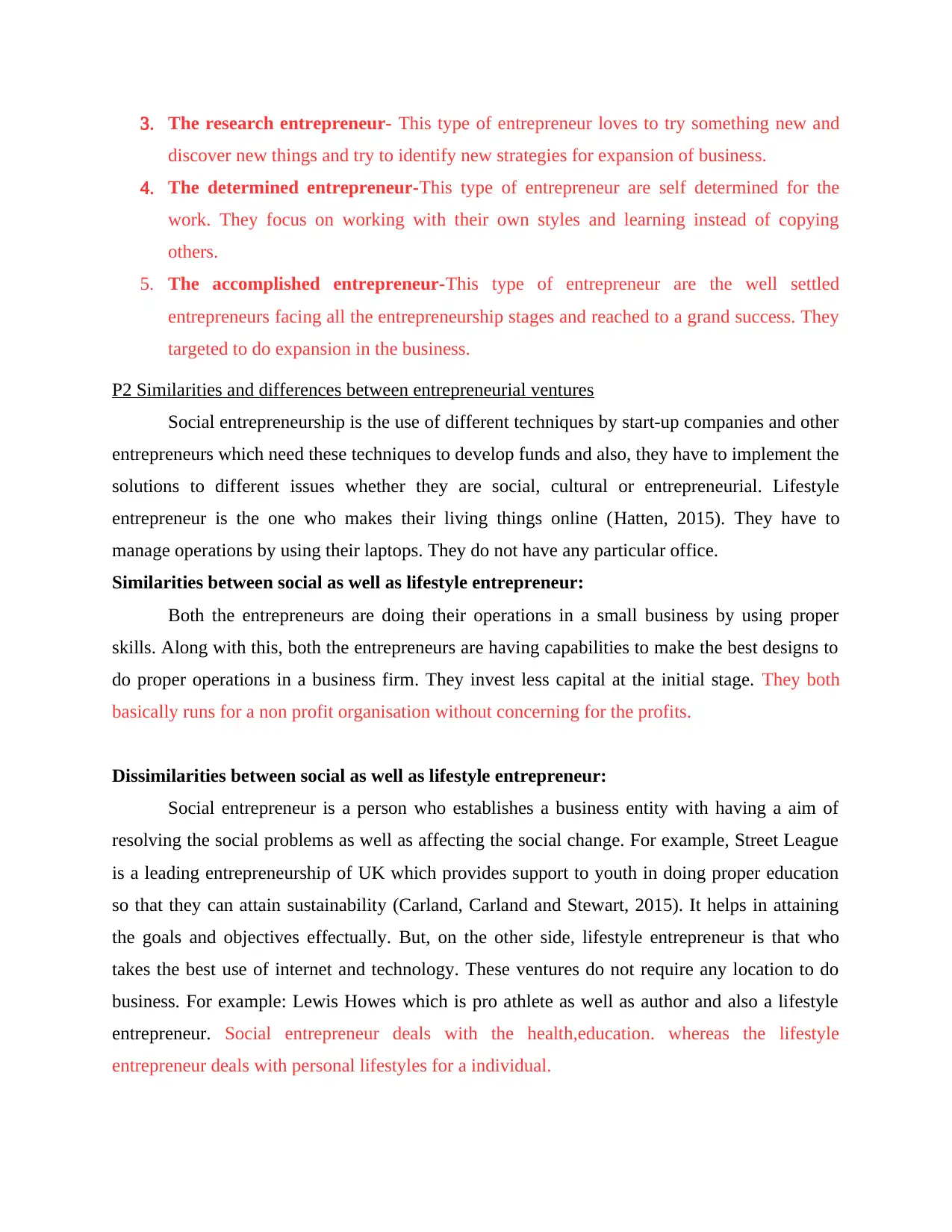
3. The research entrepreneur- This type of entrepreneur loves to try something new and
discover new things and try to identify new strategies for expansion of business.
4. The determined entrepreneur-This type of entrepreneur are self determined for the
work. They focus on working with their own styles and learning instead of copying
others.
5. The accomplished entrepreneur-This type of entrepreneur are the well settled
entrepreneurs facing all the entrepreneurship stages and reached to a grand success. They
targeted to do expansion in the business.
P2 Similarities and differences between entrepreneurial ventures
Social entrepreneurship is the use of different techniques by start-up companies and other
entrepreneurs which need these techniques to develop funds and also, they have to implement the
solutions to different issues whether they are social, cultural or entrepreneurial. Lifestyle
entrepreneur is the one who makes their living things online (Hatten, 2015). They have to
manage operations by using their laptops. They do not have any particular office.
Similarities between social as well as lifestyle entrepreneur:
Both the entrepreneurs are doing their operations in a small business by using proper
skills. Along with this, both the entrepreneurs are having capabilities to make the best designs to
do proper operations in a business firm. They invest less capital at the initial stage. They both
basically runs for a non profit organisation without concerning for the profits.
Dissimilarities between social as well as lifestyle entrepreneur:
Social entrepreneur is a person who establishes a business entity with having a aim of
resolving the social problems as well as affecting the social change. For example, Street League
is a leading entrepreneurship of UK which provides support to youth in doing proper education
so that they can attain sustainability (Carland, Carland and Stewart, 2015). It helps in attaining
the goals and objectives effectually. But, on the other side, lifestyle entrepreneur is that who
takes the best use of internet and technology. These ventures do not require any location to do
business. For example: Lewis Howes which is pro athlete as well as author and also a lifestyle
entrepreneur. Social entrepreneur deals with the health,education. whereas the lifestyle
entrepreneur deals with personal lifestyles for a individual.
discover new things and try to identify new strategies for expansion of business.
4. The determined entrepreneur-This type of entrepreneur are self determined for the
work. They focus on working with their own styles and learning instead of copying
others.
5. The accomplished entrepreneur-This type of entrepreneur are the well settled
entrepreneurs facing all the entrepreneurship stages and reached to a grand success. They
targeted to do expansion in the business.
P2 Similarities and differences between entrepreneurial ventures
Social entrepreneurship is the use of different techniques by start-up companies and other
entrepreneurs which need these techniques to develop funds and also, they have to implement the
solutions to different issues whether they are social, cultural or entrepreneurial. Lifestyle
entrepreneur is the one who makes their living things online (Hatten, 2015). They have to
manage operations by using their laptops. They do not have any particular office.
Similarities between social as well as lifestyle entrepreneur:
Both the entrepreneurs are doing their operations in a small business by using proper
skills. Along with this, both the entrepreneurs are having capabilities to make the best designs to
do proper operations in a business firm. They invest less capital at the initial stage. They both
basically runs for a non profit organisation without concerning for the profits.
Dissimilarities between social as well as lifestyle entrepreneur:
Social entrepreneur is a person who establishes a business entity with having a aim of
resolving the social problems as well as affecting the social change. For example, Street League
is a leading entrepreneurship of UK which provides support to youth in doing proper education
so that they can attain sustainability (Carland, Carland and Stewart, 2015). It helps in attaining
the goals and objectives effectually. But, on the other side, lifestyle entrepreneur is that who
takes the best use of internet and technology. These ventures do not require any location to do
business. For example: Lewis Howes which is pro athlete as well as author and also a lifestyle
entrepreneur. Social entrepreneur deals with the health,education. whereas the lifestyle
entrepreneur deals with personal lifestyles for a individual.
⊘ This is a preview!⊘
Do you want full access?
Subscribe today to unlock all pages.

Trusted by 1+ million students worldwide
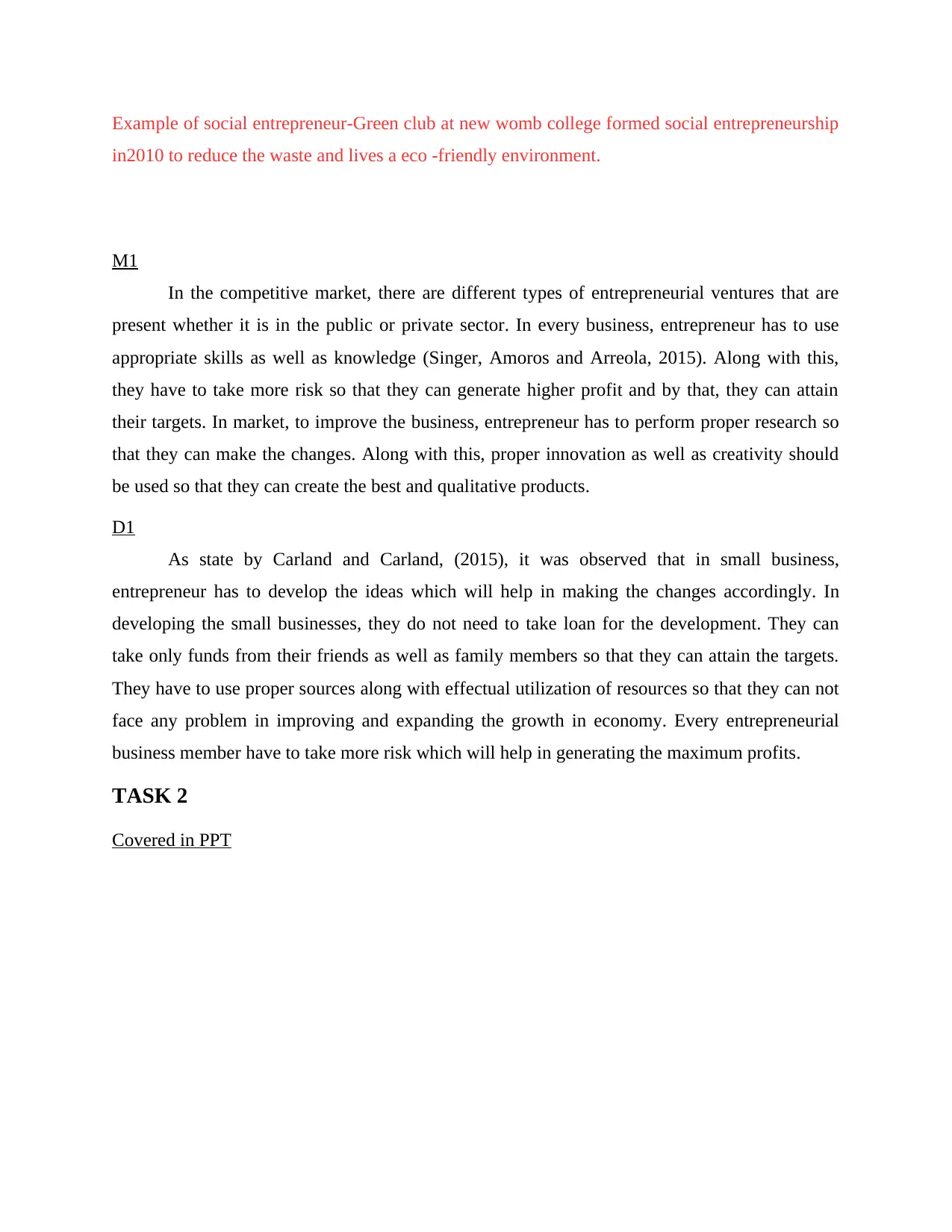
Example of social entrepreneur-Green club at new womb college formed social entrepreneurship
in2010 to reduce the waste and lives a eco -friendly environment.
M1
In the competitive market, there are different types of entrepreneurial ventures that are
present whether it is in the public or private sector. In every business, entrepreneur has to use
appropriate skills as well as knowledge (Singer, Amoros and Arreola, 2015). Along with this,
they have to take more risk so that they can generate higher profit and by that, they can attain
their targets. In market, to improve the business, entrepreneur has to perform proper research so
that they can make the changes. Along with this, proper innovation as well as creativity should
be used so that they can create the best and qualitative products.
D1
As state by Carland and Carland, (2015), it was observed that in small business,
entrepreneur has to develop the ideas which will help in making the changes accordingly. In
developing the small businesses, they do not need to take loan for the development. They can
take only funds from their friends as well as family members so that they can attain the targets.
They have to use proper sources along with effectual utilization of resources so that they can not
face any problem in improving and expanding the growth in economy. Every entrepreneurial
business member have to take more risk which will help in generating the maximum profits.
TASK 2
Covered in PPT
in2010 to reduce the waste and lives a eco -friendly environment.
M1
In the competitive market, there are different types of entrepreneurial ventures that are
present whether it is in the public or private sector. In every business, entrepreneur has to use
appropriate skills as well as knowledge (Singer, Amoros and Arreola, 2015). Along with this,
they have to take more risk so that they can generate higher profit and by that, they can attain
their targets. In market, to improve the business, entrepreneur has to perform proper research so
that they can make the changes. Along with this, proper innovation as well as creativity should
be used so that they can create the best and qualitative products.
D1
As state by Carland and Carland, (2015), it was observed that in small business,
entrepreneur has to develop the ideas which will help in making the changes accordingly. In
developing the small businesses, they do not need to take loan for the development. They can
take only funds from their friends as well as family members so that they can attain the targets.
They have to use proper sources along with effectual utilization of resources so that they can not
face any problem in improving and expanding the growth in economy. Every entrepreneurial
business member have to take more risk which will help in generating the maximum profits.
TASK 2
Covered in PPT
Paraphrase This Document
Need a fresh take? Get an instant paraphrase of this document with our AI Paraphraser
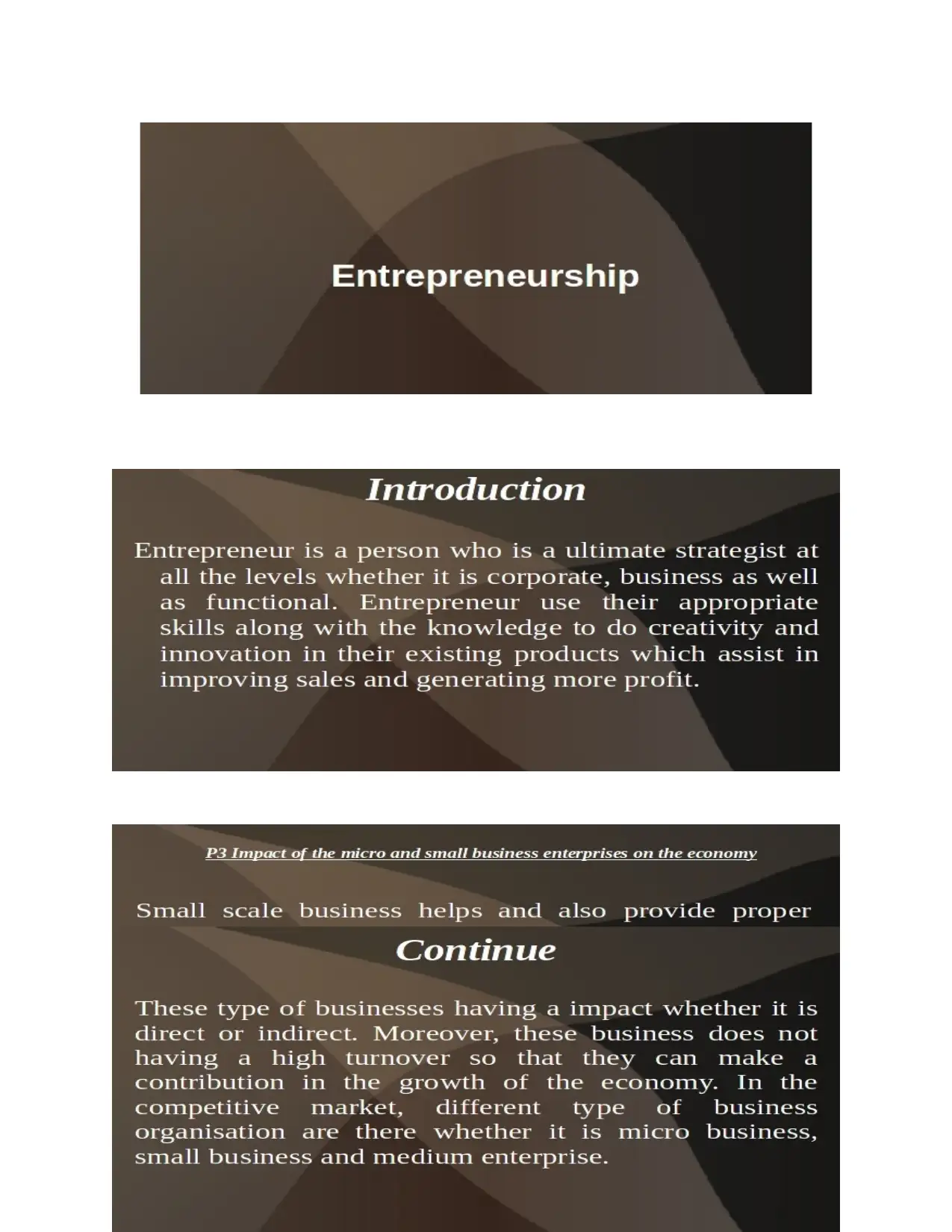

⊘ This is a preview!⊘
Do you want full access?
Subscribe today to unlock all pages.

Trusted by 1+ million students worldwide

Paraphrase This Document
Need a fresh take? Get an instant paraphrase of this document with our AI Paraphraser

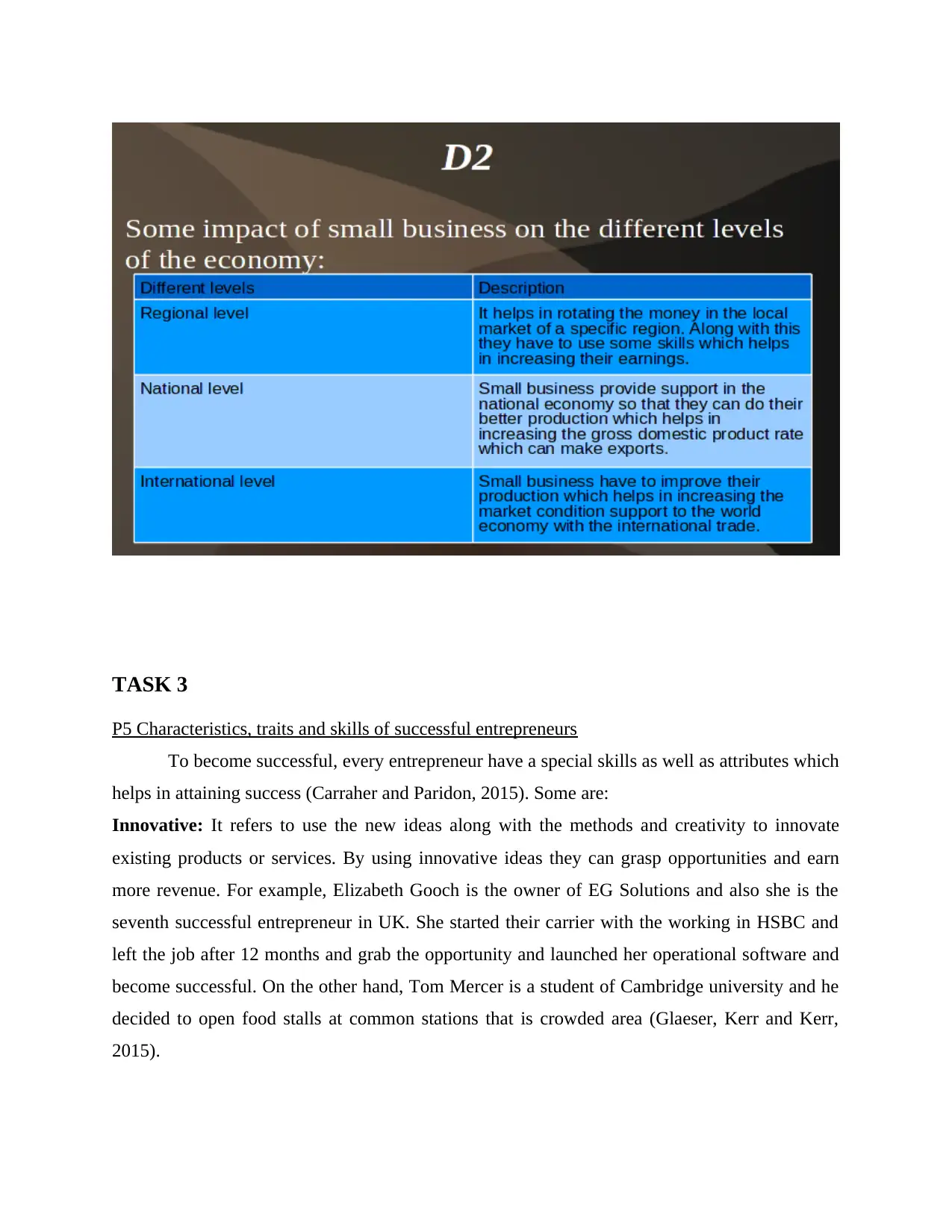
TASK 3
P5 Characteristics, traits and skills of successful entrepreneurs
To become successful, every entrepreneur have a special skills as well as attributes which
helps in attaining success (Carraher and Paridon, 2015). Some are:
Innovative: It refers to use the new ideas along with the methods and creativity to innovate
existing products or services. By using innovative ideas they can grasp opportunities and earn
more revenue. For example, Elizabeth Gooch is the owner of EG Solutions and also she is the
seventh successful entrepreneur in UK. She started their carrier with the working in HSBC and
left the job after 12 months and grab the opportunity and launched her operational software and
become successful. On the other hand, Tom Mercer is a student of Cambridge university and he
decided to open food stalls at common stations that is crowded area (Glaeser, Kerr and Kerr,
2015).
P5 Characteristics, traits and skills of successful entrepreneurs
To become successful, every entrepreneur have a special skills as well as attributes which
helps in attaining success (Carraher and Paridon, 2015). Some are:
Innovative: It refers to use the new ideas along with the methods and creativity to innovate
existing products or services. By using innovative ideas they can grasp opportunities and earn
more revenue. For example, Elizabeth Gooch is the owner of EG Solutions and also she is the
seventh successful entrepreneur in UK. She started their carrier with the working in HSBC and
left the job after 12 months and grab the opportunity and launched her operational software and
become successful. On the other hand, Tom Mercer is a student of Cambridge university and he
decided to open food stalls at common stations that is crowded area (Glaeser, Kerr and Kerr,
2015).
⊘ This is a preview!⊘
Do you want full access?
Subscribe today to unlock all pages.

Trusted by 1+ million students worldwide
1 out of 18
Related Documents
Your All-in-One AI-Powered Toolkit for Academic Success.
+13062052269
info@desklib.com
Available 24*7 on WhatsApp / Email
![[object Object]](/_next/static/media/star-bottom.7253800d.svg)
Unlock your academic potential
Copyright © 2020–2025 A2Z Services. All Rights Reserved. Developed and managed by ZUCOL.





